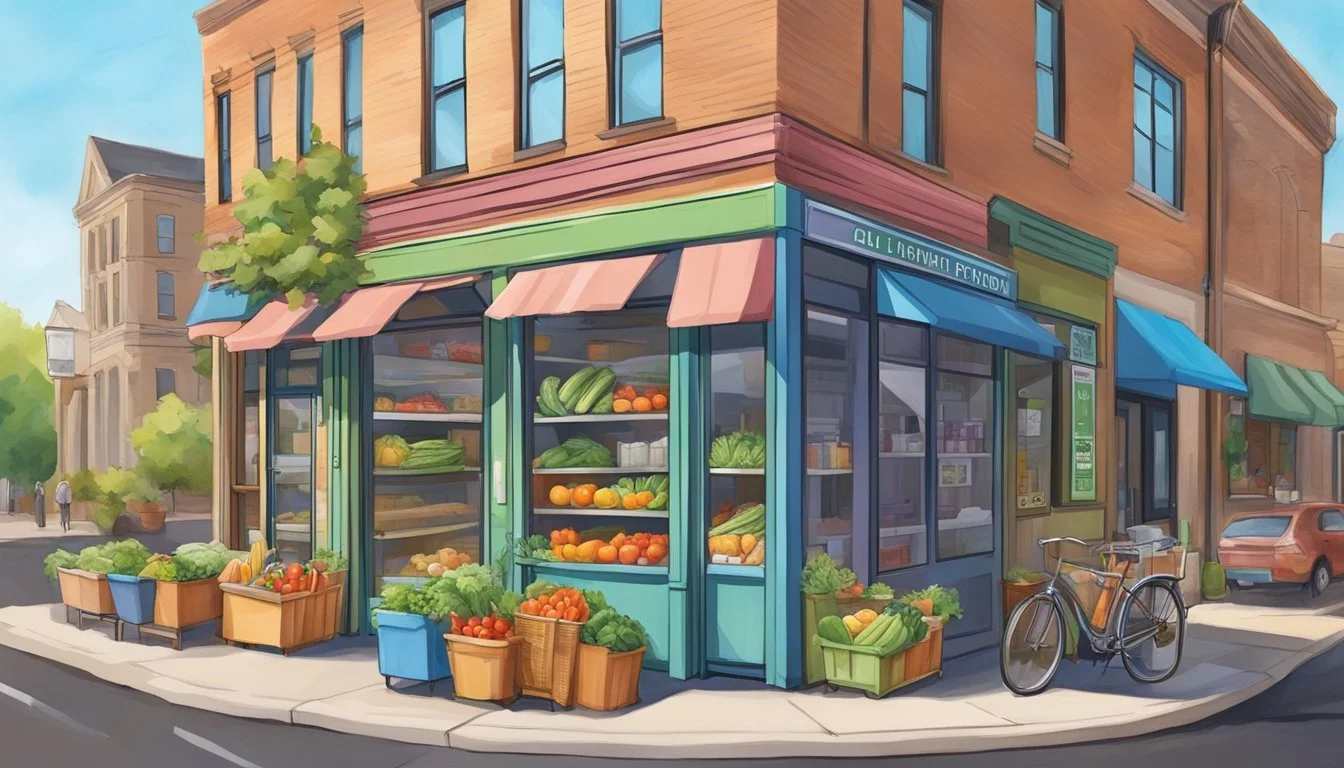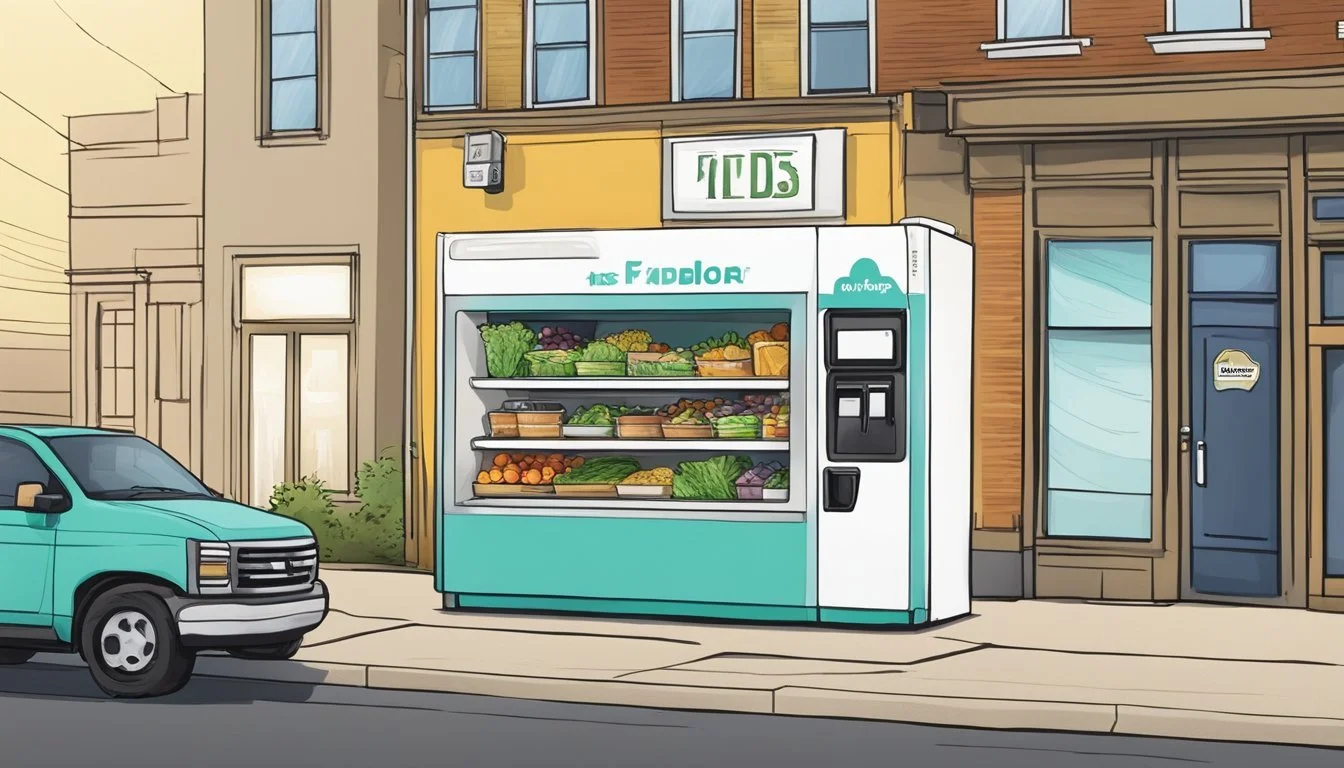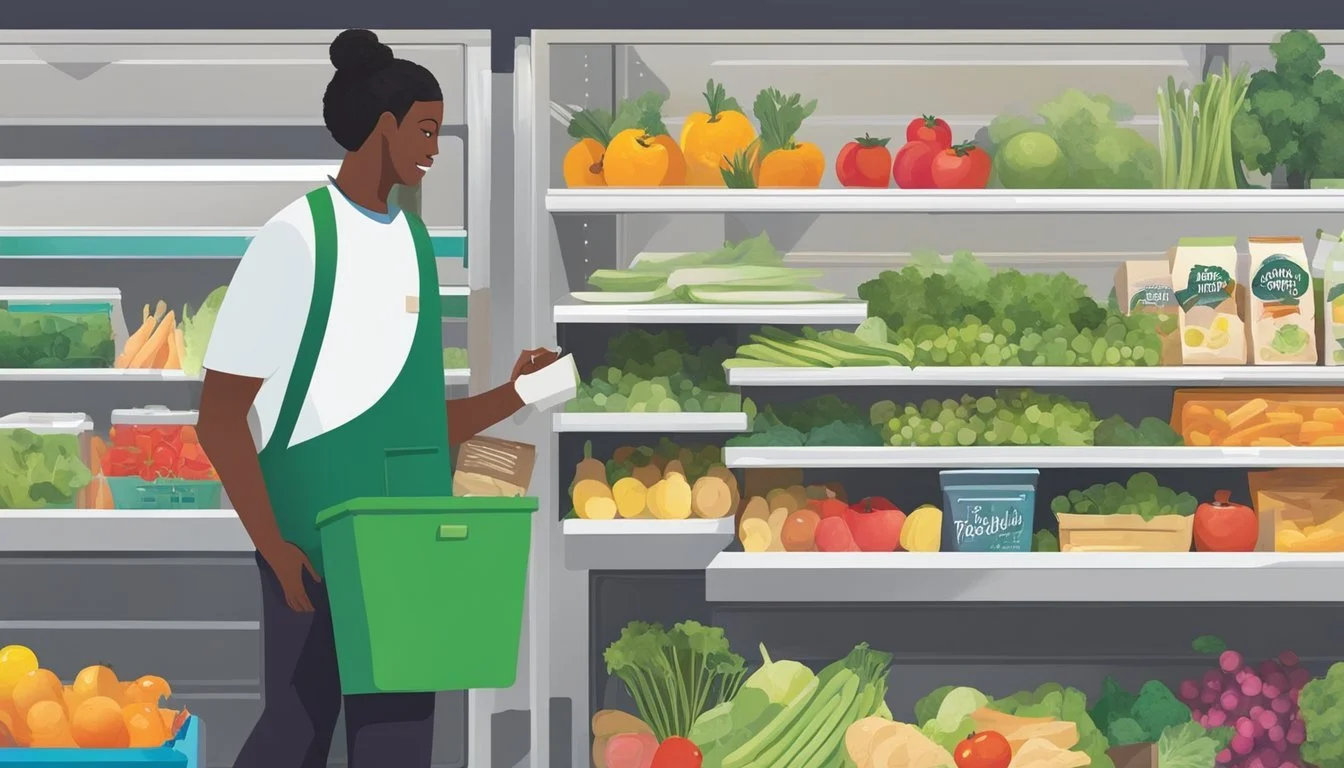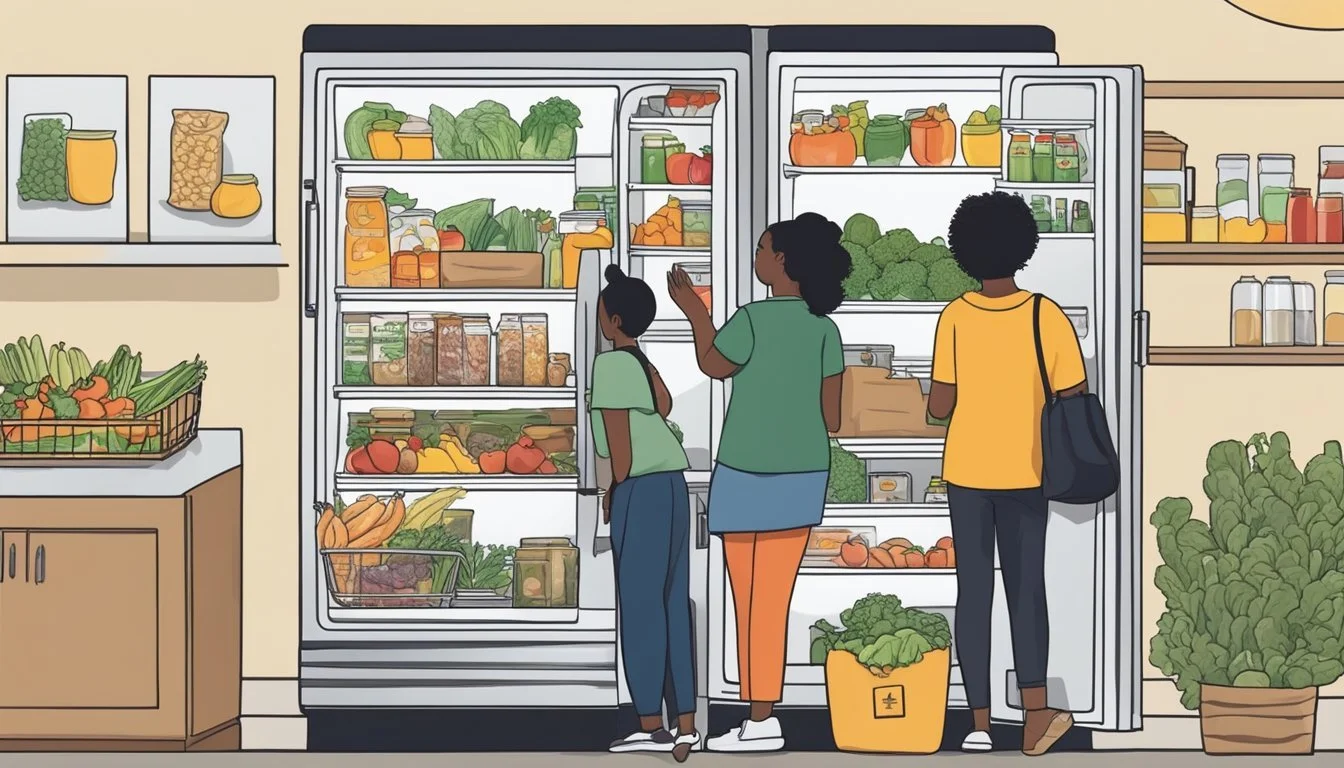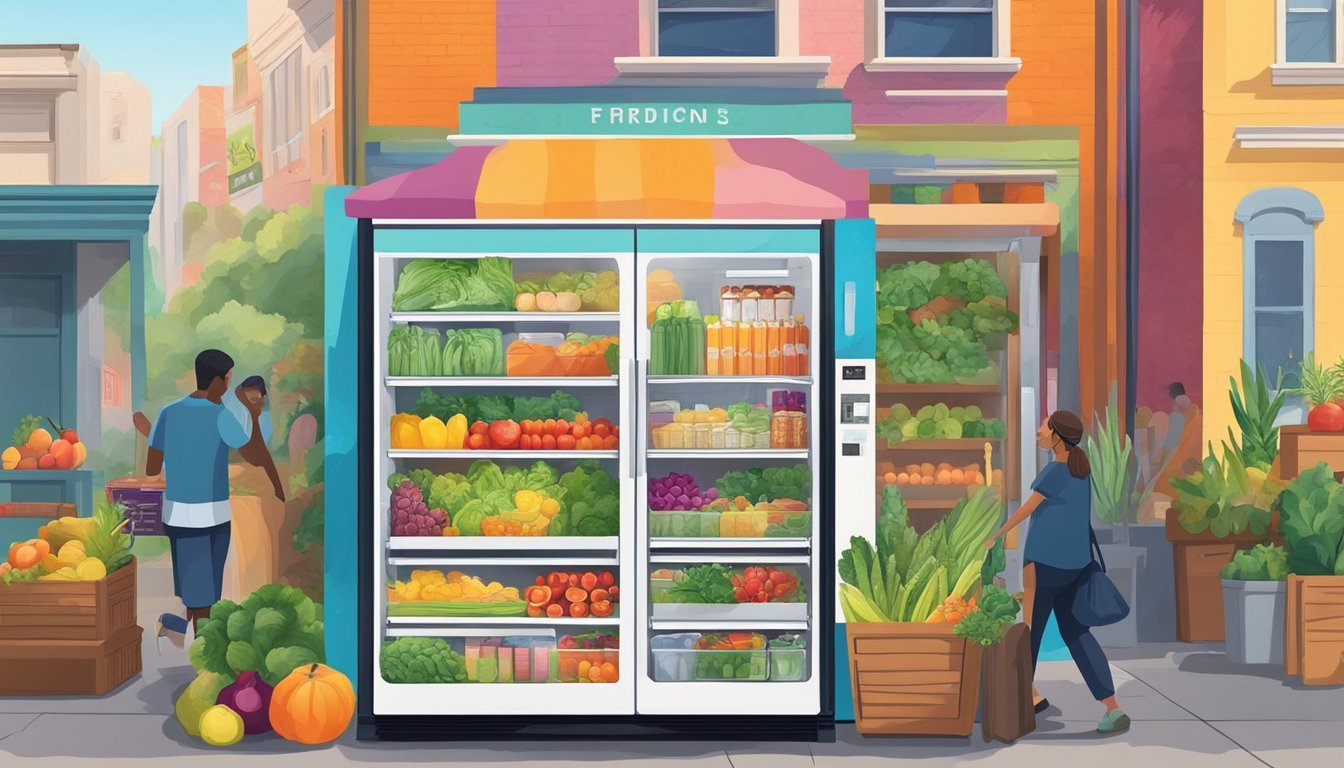Norman, OK Community Fridge
Combating Hunger with Local Solidarity
Community fridges, a bold and compassionate initiative, have been making their way into the social fabric of many cities to tackle issues of food insecurity and waste. Norman, Oklahoma, has embraced this concept wholeheartedly, fostering a system where residents can access free food, donated and maintained by the community. This mutual aid source functions as both a point of support for those in need and a means to reduce food waste, resonating with the values of sharing and sustainability.
In Norman, the presence of these fridges has not been without its hurdles. Civic adjustments were needed to accommodate the novel idea, and some relocation issues had to be addressed, embodying the growing pains of integrating such a community-led resource into established urban norms. However, through collaboration and advocacy, the local government and community members are striving to find a balance that honors health, safety, and the collective welfare.
Ensuring that the community fridge in Norman continues to serve those in need has been a priority for the city council and local advocates. By modifying city codes and obtaining the necessary permits, they have laid the groundwork for the initiative to thrive, setting a precedent that could encourage similar efforts in other neighborhoods. The township's effort to reconcile civic responsibilities with this innovative form of mutual aid serves as a tangible commitment to inclusivity and community resilience.
Overview of Community Fridges
Community fridges, also known as solidarity fridges or honesty fridges, are public refrigerators set up to address food insecurity by enabling members of the community to access nutritious food for free. These refrigerators operate on the principle of sharing, where people take what they need and donate what they can. They are often placed in easily accessible locations and aim to reduce food waste while providing for those in need.
Operation: Community fridges are typically run by local organizations or a group of volunteers and rely on donations from individuals, businesses, or food banks.
Maintenance: The responsibility for maintaining the fridge’s cleanliness and monitoring for expired products usually falls on the community members or the hosting organization.
Legalities: Some cities have created legislation to support the operation of community fridges, understanding the role they play in fostering community solidarity and food access.
Costs: Hosting a community fridge incurs certain costs, such as electricity, which can average around $150 annually in some locations.
Community fridges not only provide a direct means of food support but also promote a model of communal care and responsibility, as they depend on and encourage active participation and honesty from the public. Whether an individual needs a meal or wants to contribute, the community fridge stands as a testament to the collective effort to ensure no one goes hungry.
Community Fridge in Norman, Oklahoma
The City of Norman, Oklahoma, is recognized for its forward-thinking approaches to human rights and social issues. One initiative that underscores this commitment is the establishment of community fridges. These fridges are a testament to Norman’s dedication to community-driven solutions for food insecurity, allowing residents to share perishable and non-perishable foods with those in need.
The Norman Community Fridge operates on a basic principle: Take what you need, leave what you can. It is a mutual aid project that is maintained by local volunteers and is accessible to everyone in the community. The initiative not only reduces food waste but also provide support for individuals facing financial difficulty.
Locations and Accessibility:
Resonator Fridge: Previously established but no longer in operation.
Outreach Fridge & Pantry: Situated inside Outreach Thrift at 621 12th NE, this community fridge is easily accessible and offers a variety of food options.
Redeemer Community Fridge: This fridge is found at 1320 W Lindsey St, expanding access to fresh food across the city.
The Norman City Council has taken an active role in legalizing and supporting community fridge programs. Advocates have often pointed out Norman's leadership in human rights initiatives, and the council’s support for community fridges is a continuation of that heritage.
Norman's dynamic local community has shown strong participation in the community fridge program. Volunteers contribute by stocking and cleaning the fridges, and residents are encouraged to participate in this communal effort. This collaborative approach exemplifies Norman's culture of caring and its investment in sustainable community-driven systems.
Location and Accessibility
The Norman, OK Community Fridge aims to address food insecurity through accessible public spaces, with critical involvement from local organizations that ensure its operation and reach.
Resonator Institute's Role
The Resonator Institute, pivotal in the initiative, advocates for public health by ensuring that the community fridge is maintained through collaborative efforts. They underline the necessity of making food accessible to everyone, with a particular focus on supporting those who are homeless or in need.
Main Street Placement
Previously situated on 325 E. Comanche St., the fridge has been relocated and now finds its home inside Outreach Thrift, at 612 12th Ave. NE. This placement on Main Street is strategic for two reasons: it remains within reach of individuals who rely on its offerings and symbolizes the importance of accessibility in high-traffic, centralized locations. Alan Hatcher, a local advocate for accessible public spaces, stresses the fridge's vital role in community support.
Operational Guidelines
The operational guidelines for the Community Fridge in Norman, OK, ensure the safety and efficiency of the service. These guidelines are tailored to meet local city codes and provide clear instructions for the donation and maintenance of both perishable and non-perishable items, while outlining necessary health and safety procedures. Additionally, they encompass the regulatory compliance and permits required for lawful operation.
Perishable and Non-perishable Items
Donation Guidelines:
Perishable items must pass temperature checks to ensure they are safe for consumption.
Non-perishable items should be within their best-before dates and in unopened, original packaging.
Acceptance Standards:
Donations are scrutinized to comply with health regulations.
The fridge operates clearly labeled zones for perishable and non-perishable goods.
Health and Safety Procedures
Routine Checks:
Daily temperature checks are conducted to maintain food at safe temperatures.
Sanitation is upheld with regular cleanings scheduled for the refrigerator's interior and exterior.
Safety Measures:
The refrigerator is equipped with instructions for food handling and emergency contact information in case of non-functioning equipment or need for service.
Regulatory Compliance and Permits
Permit Requirements:
The refrigerator is designated as a community resource, complying with Article 36 of Chapter 13 of the City Code.
The permit confirms adherence to city code stipulations, including location and operation conditions.
Compliance Verification:
The City of Norman issues the permit after verifying that all regulatory compliance steps are met.
Contact information for the City of Norman Code Compliance Department is provided for oversight.
Community Support and Donations
The success of the Norman, OK Community Fridge initiative is largely due to robust community support and generous donations which fund ongoing operations and cover essential costs.
Role of Local Businesses
Local businesses in Norman play a critical role by providing regular food donations to the community fridge. These businesses, from grocery stores to restaurants, help ensure a constant supply of fresh and nutritious items. They are pivotal in maintaining stock levels, often donating perishable goods that are close to their sell-by dates but still perfectly safe to consume.
Individual Contribution Processes
Individuals contribute to the community fridge through a streamlined process. People can donate food directly to the fridge locations. Non-perishable goods and fresh produce are typically preferred. Guidelines for acceptable items are made clear to discourage the disposal of expired or unsafe food. For transparency and ease, some fridges may display a list of needed items or use social media platforms to communicate current stock levels and specific needs.
Financial Support and Electricity Costs
The financial aspect of the Community Fridge project is supported through donations from the public. These funds are crucial for covering the electricity costs of running the fridges 24/7, which is a substantial part of the initiative's overhead. To facilitate financial support, the project often utilizes digital payment platforms such as Venmo, allowing for a seamless and accessible way for community members to contribute monetarily.
Challenges and Solutions
The successful operation of community fridges in Norman, OK hinges on overcoming several key challenges. Addressing these efficiently ensures the sustainability of such essential services.
Navigating City Regulations
To legally install and maintain community fridges, proponents must acquire the appropriate permits as mandated by the city code. Norman City Council recently voted to modify the code, allowing for community fridges with permits. This development is pivotal in ensuring that these fridges can operate without legal hindrance, provided they comply with city regulations.
Addressing Public Nuisance Concerns
Community fridges have to manage both easement obstruction and public nuisance issues. Regular maintenance is crucial to prevent the accumulation of rotten or unwanted food. Ensuring proper operation notably during extreme weather is vital to maintain hygiene standards and prevent them from becoming a public nuisance.
Action Items:
Regular cleaning schedules
Monitoring food quality and safety
Maintenance checks during hot summers
Ensuring Continual Service
Consistent operation and stocking are central to the role of community fridges in fighting hunger. Advocates like Bridget Burns highlight the importance of maintaining fridges, especially during demanding periods. Community involvement and volunteer services are key components to sustain an ongoing service that supports the community effectively.
Strategies for Continual Service:
A robust volunteering program
A network of local donors and supporters
Establishing a feedback system to improve service quality
Community Impact
The Community Fridge in Norman, Oklahoma has become a pivotal resource with far-reaching effects. It serves not only as a symbol of communal support but also as a practical tool in addressing several pressing societal issues.
Support for the Homeless and Unhoused
Nonprofit organizations and volunteers have established a community fridge to provide the homeless and unhoused individuals with reliable access to food. This initiative significantly helps to alleviate hunger among these vulnerable populations. The fridge's former location was readily accessible, but after being displaced, it was moved to Outreach Thrift at 612 12th Ave. NE., making it a 22-minute walk from its original location. Despite this, it continues to support those in need, ensuring that lack of food security does not remain a barrier.
Reducing Food Waste
The community fridge plays a critical role in reducing food waste by redistributing surplus food. Local residents and businesses can contribute excess edible items, which are then available for those in need. This cycle of giving helps ensure that food, which would otherwise go to waste, supports the community instead.
Advancing Food Security
By securing a safe space for a community fridge, Norman City Council has taken an affirmative step toward advancing food security within the community. This decision facilitates the legitimate operation of such fridges, provided they comply with the necessary permits. These efforts focus on creating a sustainable food-sharing network that any community member can access, thus working towards ensuring that food is acknowledged as a fundamental right.
Civic Engagement and Partnerships
The development of the Norman community fridge exemplifies proactive civic engagement and sustainability via collaboration with local government and organizations.
Collaboration with City Council Members
The Norman City Council, with significant contributions from Ward 1 Councilmember Brandi Studley and Ward 2 Councilmember Lauren Schueler, played a key role in modifying city code to permit community fridges. This legislative change reflects a dedication to addressing local food insecurity and supporting grassroots initiatives within the community.
Initiatives by Local Nonprofits
April Heiple, leading the organization Food and Shelter, coordinates closely with other local nonprofits like Outreach Thrift to facilitate resources for the community fridge. These partnerships are pivotal in ensuring the fridge is well-stocked and managed, symbolizing a community united against hunger.
Community Outreach Programs
Outreach programs are integral to the project's success, focusing on educating the community members about the availability and purpose of the community fridge. They actively involve Norman's residents, fostering a sense of ownership and shared responsibility towards communal well-being. The aim is to create a self-sustaining system benefiting all community members, especially those in need.
Sustaining the Community Fridge Movement
The growth and endurance of the community fridge movement in Norman, OK hinges on strategic educational outreach, a well-connected fridge network, and a clear, attainable vision for the future. These elements work together to ensure that community fridges continue to serve as valuable resources for food sharing and solidarity.
Educational Outreach and Materials
Educational outreach is crucial for the sustenance of community fridges. The program Uprooted & Rising Indian Territory plays a pivotal role in informing Norman residents about the community fridge initiative. It's essential to provide materials that outline a 5-step guide to starting a fridge, including engaging with the community, understanding local laws, and maintaining health and safety standards. Workshops and information sessions help residents to grasp the concept and encourage participation in the network.
Expanding the Community Fridge Network
Solidarity fridges operate on the principle of mutual aid and require the support of local businesses and residents to thrive. Expanding the Norman community fridge network requires identifying strategic locations that are accessible and partnering with organizations such as Outreach Thrift. With each additional fridge, care should be taken to ensure they are stocked consistently and comply with city regulations, which have recently been modified to acknowledge the importance of community fridges.
Long-Term Vision and Goals
A long-term vision for the community fridge movement should focus on sustainability and adapting to the evolving needs of the community. Setting tangible goals such as enhancing food security, reducing waste, and strengthening community bonds are fundamental. By garnering support from a broad base of volunteers and local policymakers, community fridges can become fixtures in Norman's landscape of community-driven support.
User Guide
The Community Fridge in Norman, OK, serves as a mutual aid resource that operates on an honor system. The following guidelines ensure the fridge remains a safe and efficient resource for everyone.
How to Use the Fridge
The fridge is intended for both taking and leaving food. Individuals in need may take food items with no need for exchange or compensation. They should:
Open the fridge during daylight hours.
Take only what they need, leaving enough for others.
Close the door firmly after use to maintain the fridge's temperature.
Donation Guidelines
Donations are welcome following these guidelines:
Food must be fresh and within its use-by date.
Pre-packaged and labeled items are preferred for easier identification.
Homemade meals should have a list of ingredients in both English and Spanish, if possible.
No alcoholic beverages or opened products should be placed in the fridge.
Donors should:
Ensure items are clean and neatly arranged.
Check that the fridge is not overly full— if there is no room, they should come back later or find another location to donate.
Leave donations during windows of high visibility for safety and community access.
Safety and Maintenance Protocols
Regular cleaning and maintenance ensure the health and safety of fridge users. Here are the protocols:
The fridge's temperature should be routinely checked and maintained below 40°F (4°C).
The surrounding area must be kept clean and sanitized.
Damaged or expired items should be disposed of immediately, and the fridge should be restocked with fresh items.
The maintenance schedule, including cleaning and health checks, will be updated and displayed prominently for users to view.
By following these protocols, the Norman Community Fridge aims to be a reliable source of sustenance for those in need while building a strong sense of community through shared responsibility and generosity.


